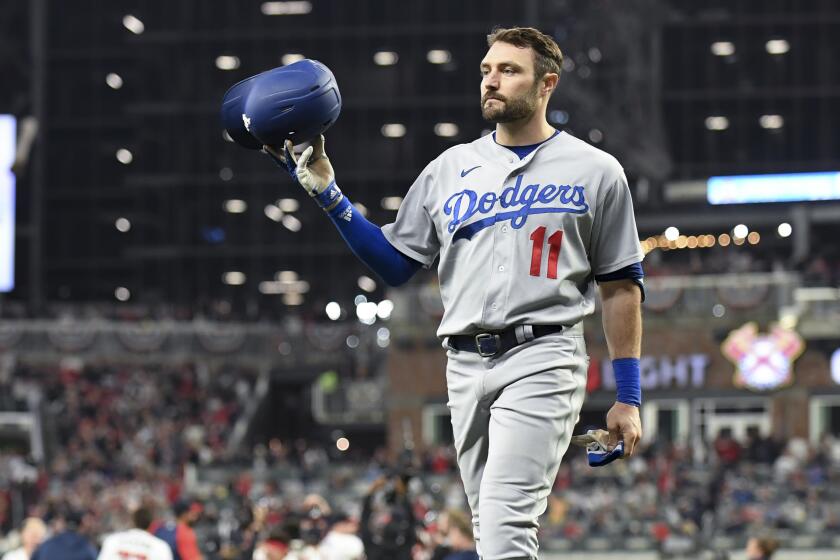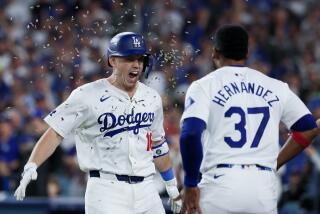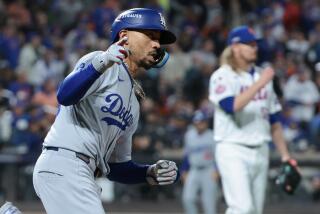Outplayed, cold hitting, and more: Takeaways from Dodgers’ NLCS Game 6 loss to Atlanta
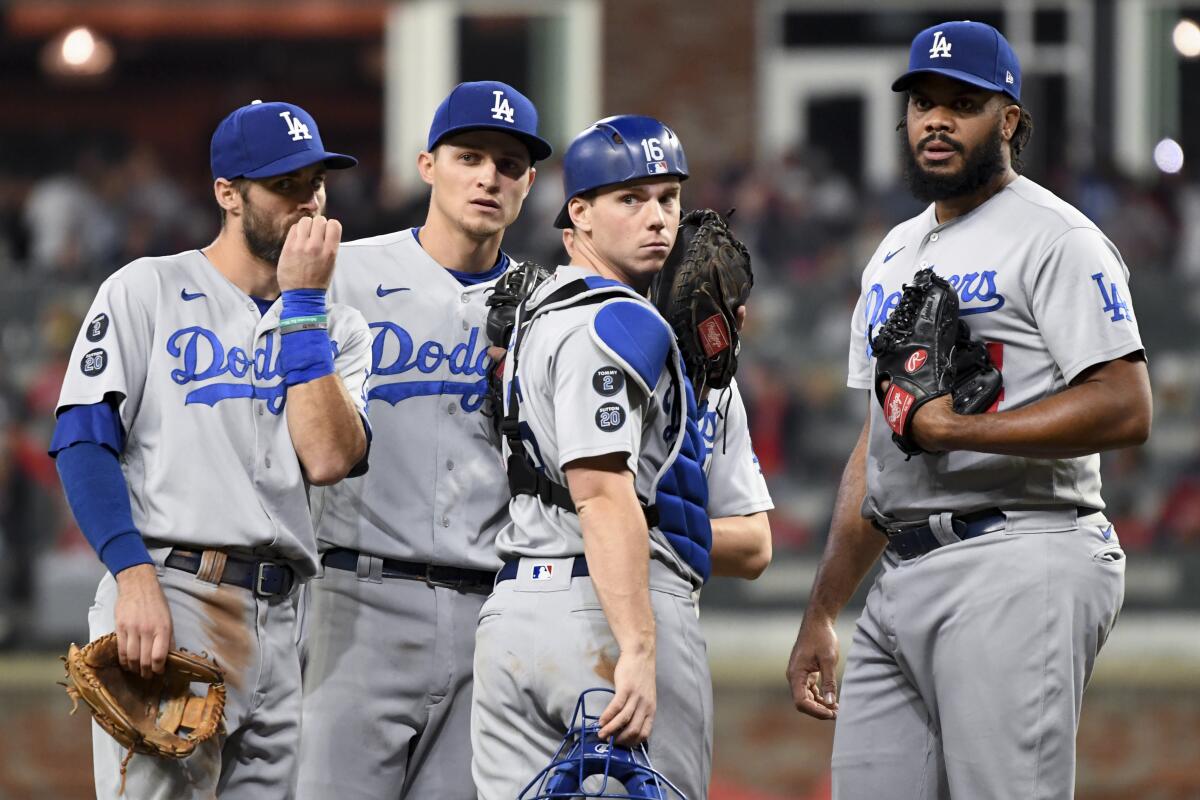
ATLANTA — This time, there was no comeback. No pennant-snatching rally. No trip back to the World Series.
Instead, the Dodgers’ season ended on Saturday night in Atlanta, their title defense dashed by the Atlanta Braves in a 4-2 loss in Game 6 of the National League Championship Series.
“It’s still not lost on any of us that we didn’t accomplish our goal,” manager Dave Roberts said in the aftermath. “But for me I’m giving credit to the Braves because they outplayed us, plain and simple.”
As the Braves move on, and the Dodgers head into the off-season, here are five takeaways from the NLCS.
Fine margins

The Dodgers’ season ended after losing Game 6 of the NLCS to the Atlanta Braves. Los Angeles Times sports writer Jorge Castillo, along with columnists Dylan Hernandez and Bill Plaschke, break down what happened and where the Dodgers go this offseason.
Four of the six games in this series were decided by two runs or fewer.
The Braves won three of them, and there is no shortage of explanations why.
With runners in scoring position, the Braves batted .343 to the Dodgers .244 — a trend that popped up again on Saturday night when the Dodgers were 2 for 10 in such situations, including a crushing sequence in the seventh when they struck out three straight times against Tyler Matzek with the potential tying runners at second and third.
The Braves’ starting pitchers were more consistent, posting a 4.56 ERA over 23 ⅔ innings compared with the Dodgers’ 7.71 mark in just 18 ⅔ innings.
And the back of the Braves bullpen was stouter, epitomized by a combined five innings of near dominance from Matzek, Will Smith and A.J. Minter in Game 6.
“Our bullpen was unbelievable this whole series,” Braves manager Brian Snitker said. “What Minter and Matzek did today was just phenomenal. And Matzek’s been doing it the entire series. I said I would like to cut that [series] MVP thing up and give him a little piece of it because that guy was just spectacular the whole series.”
A difficult World Series title defense that included the Dodgers chasing the rival Giants ended up costing the Dodgers vs. the Atlanta Braves.
Buehler battered again
Entering this year’s NLCS, Walker Buehler had developed a reputation as one of baseball’s best big-game pitchers.
In his previous 11 postseason starts, he’d given up two or fewer runs 10 times and only three in the other.
He had been key to the Dodgers’ comeback from a 3-1 hole in last year’s NLCS, pitching six scoreless innings in Game 6 of that series.
And, even after giving up four runs (two earned) in a 3 ⅔-inning start in Game 3 of this year’s rematch last week, he came into Saturday’s Game 6 confident he could extend his team’s season.
He didn’t.
Instead, the right-hander made the last in a string of underwhelming starts from the Dodgers rotation, giving up four runs in four innings while pitching on short rest in place of a fatigued Max Scherzer.
“You want to be like this herculean thing and go out and throw and be really good,” Buehler said after the game. “And I just wasn’t. It stinks.”
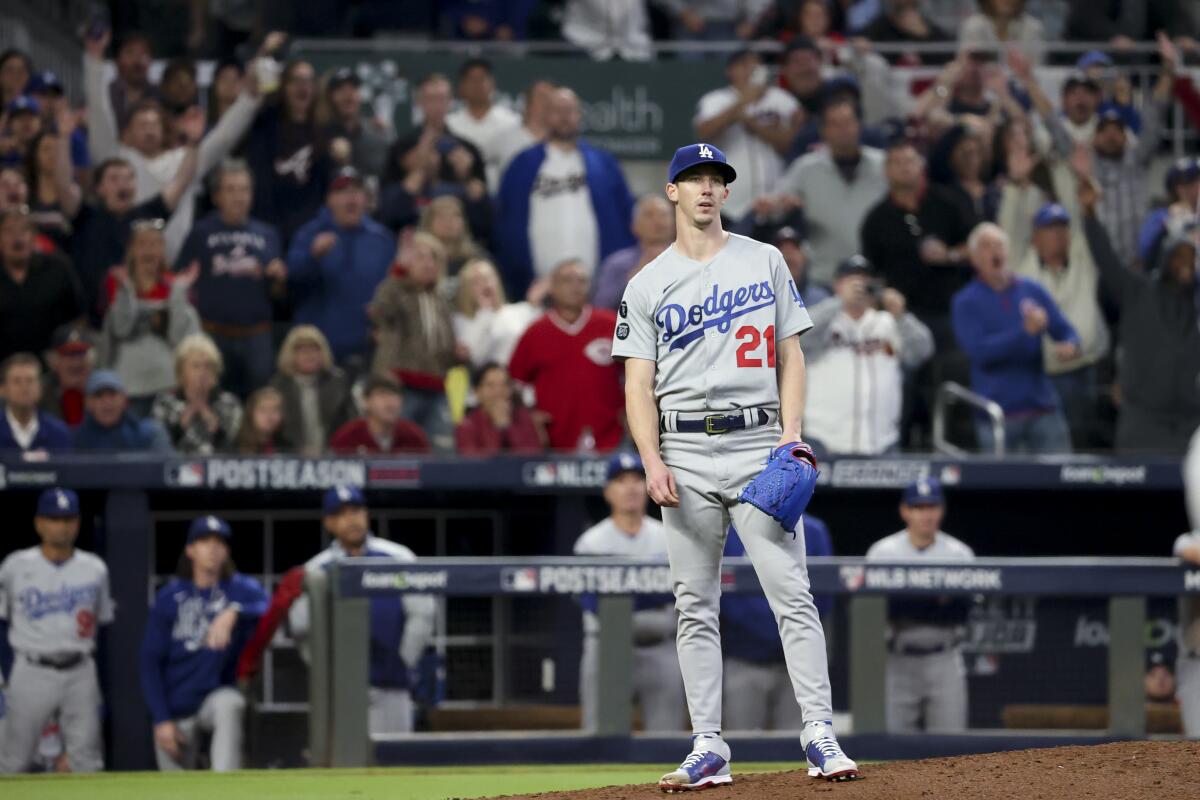
Buehler failed to maintain peak form across four starts in these playoffs, posting a playoff-career-worst 4.91 ERA in 18 ⅓ innings — almost half of which came during his two short-rest starts.
Saturday was also his worst performance in an elimination game, after having given up only two total runs in three previous such starts.
“I think we have a really special clubhouse and a really special team, and Game 6, elimination game, you get the ball, you want to be better than that,” Buehler said. “I just wasn’t. It’s a hard pill to swallow.”
Cold at the top
Buehler wasn’t the only Dodgers star to struggle in the NLCS.
The top four batters in the team’s lineup — Mookie Betts, Trea Turner, Corey Seager and Will Smith — all failed to find a consistent rhythm in the series.
None in the group hit better than .240, and Seager was the only one to have multiple RBIs or an on-base-plus-slugging percentage above .700.
And compared with the Braves biggest bats, they were sorely outshined.
The final combined numbers for the Dodgers’ leading quartet: 19 for 95 (.200 average) with two doubles, three home runs and seven RBIs.
The Braves’ top four of Eddie Rosario (who won series MVP), Freddie Freeman, Ozzie Albies and Austin Riley, on the other hand: 32 for 96 (.333 average) with five doubles, a triple, six home runs and 18 RBIs.
“We just never got that big hit in the middle of the game,” Seager said. “We scored a lot of runs some games, but it seems like those games that we really grinded, we never got that big hit in the middle of the game to kind of start things and move the line up, take the walk. We missed that this postseason.”
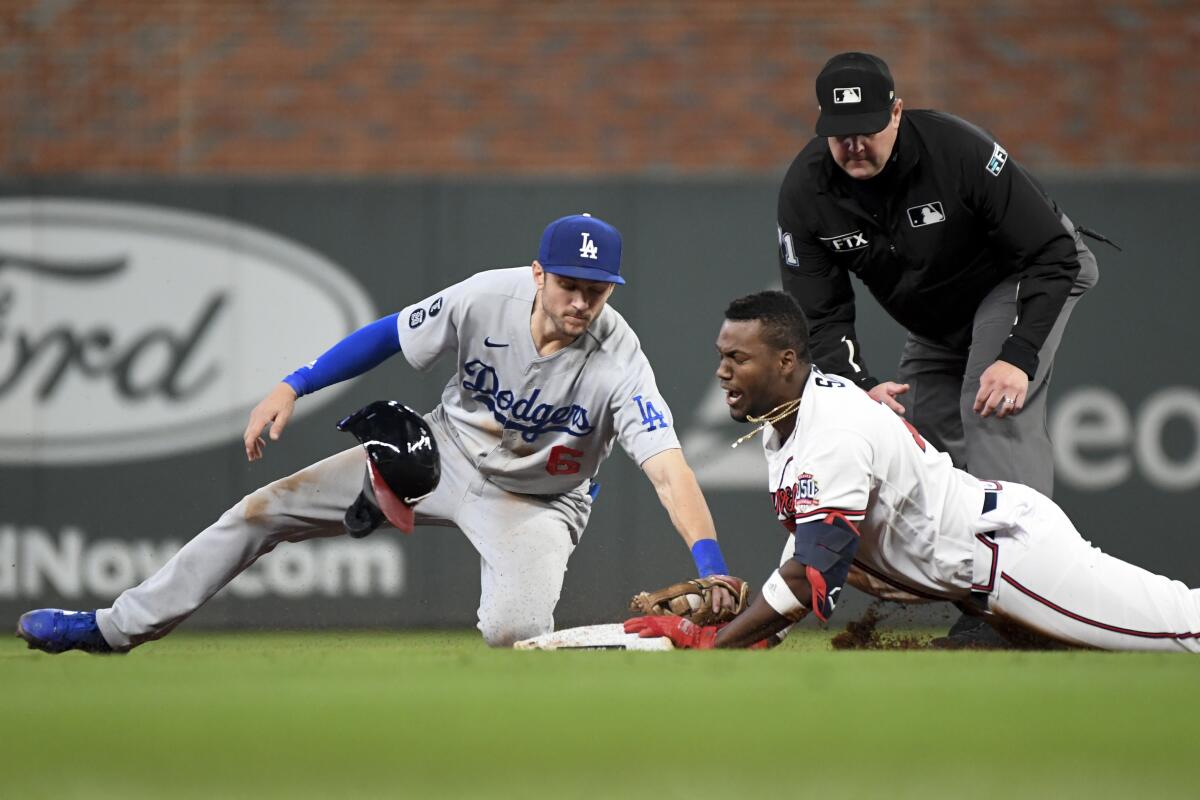
All the right moves
In a series full of little decisions, the Braves seemed to more often push the right buttons and catch the right breaks.
Game 6 provided several defining examples.
Braves starter Ian Anderson had success with his apparent game plan of pitching on the edges of the zone and incorporating more changeups.
Buehler, meanwhile, was punished for a fastball-heavy approach in one of the game’s defining sequences, when Rosario hit an inside cutter for a go-ahead three-run homer in the fourth.
“Obviously that’s a pitch that Walker feels good with, but certainly you can tell that Rosario was sped up,” Roberts said, noting Rosario had been keeping up with Buehler’s velocity during the at-bat. “I don’t want to second-guess a sequence, but certainly we could have done different things. But we didn’t.”
The Braves also had more success with their pinch-hitting decisions.
An at-bat before Rosario’s homer, Snitker decided to end Anderson’s start early and send Ehire Adrianza to the plate. He doubled down the line to keep the inning alive.
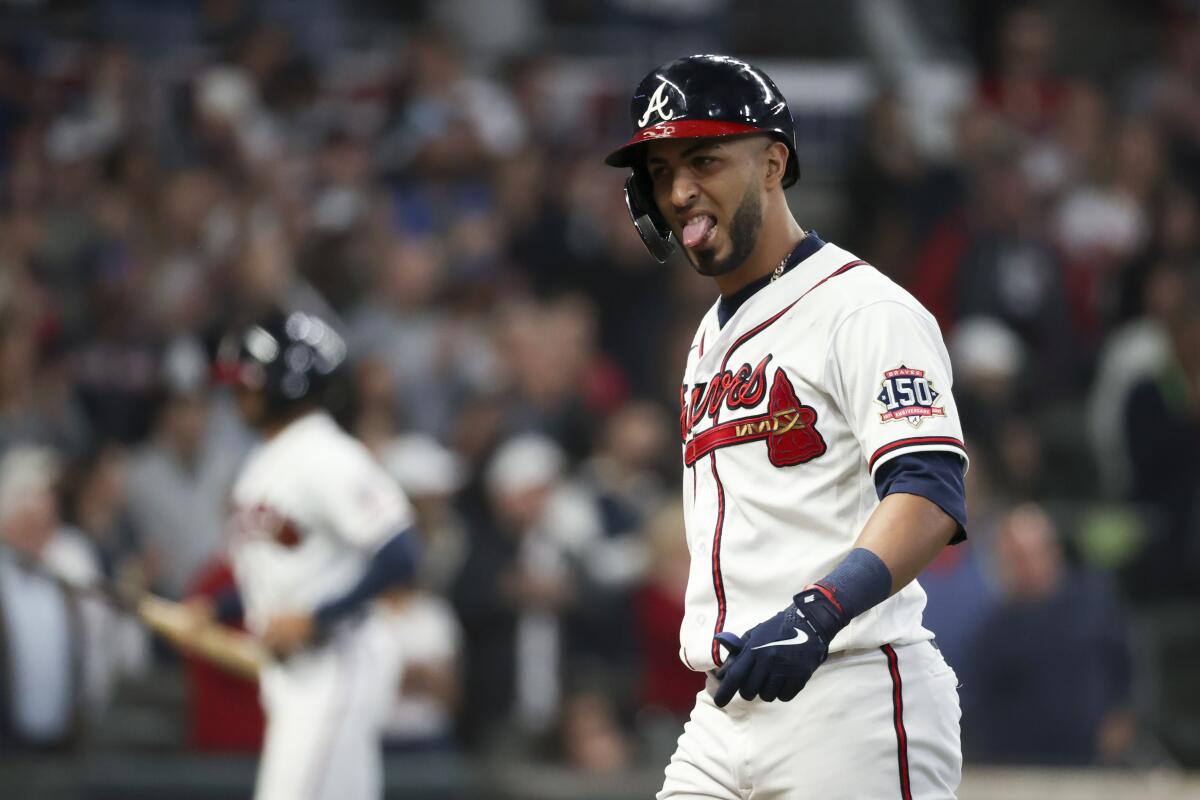
Conversely, the Dodgers bench flopped in its chance to sway the game, when Albert Pujols (who entered earlier as a mid-game replacement) and Steven Souza Jr. (who was pinch-hitting) became Matzek’s first two strikeout victims in the seventh.
“We got beat,” Roberts said. “The Braves played a heck of a series. I think offensively they game-planned against us really well. Defensively or pitching-wise, I think that they prepared for our hitters really well.”
Last goodbyes?
Uncertainty underscored the Dodgers’ postgame scene, with several key pieces of the team’s recent core set to hit free agency this off-season.
Three of them — Seager, Chris Taylor and Kenley Jansen — spoke with reporters outside the clubhouse following what were potentially their last games in Dodgers uniforms.
“It’s unknown,” Seager said. “You’re saying goodbyes without really knowing. You do the normal stuff. You wish everybody a happy off-season. Remember it, remember how it feels, prepare for next year, stuff like that. But then you’re uncertain about where you’ll be. It’s definitely sad. It’s human nature not to think about it, but you try to do the best you can.”
Atlanta outfielder Eddie Rosario completes his NLCS MVP campaign with a three-run homer in the Dodgers’ disastrous fourth inning of Game 6 on Saturday.
Seager said he’d “absolutely” love a chance to return to the Dodgers next year, though he will certainly draw strong interest from other clubs on the open market too.
“I grew up here,” he said. “I’ve spent a lot of time here. I believe in what these guys do. I believe in how we go about it.”
Taylor and Jansen shared similar sentiments, reflecting on their Dodgers careers while acknowledging the unknowns that lie in the winter ahead.
“I don’t know what’s gonna happen,” Taylor said. “All I can say is I’ve loved every minute I’ve been involved here. I have no idea what’s gonna happen this off-season. But the last five seasons I’ve been here, it’s been amazing.”
Echoed Jansen: “It’s not in my hands. I gotta thank God for the great opportunity I had here as a Dodger. I’m thankful to be here for all these years. This is the only team I know. They believed in me when I was 17 years old as a catcher. And then they made me a pitcher and believed in me as a pitcher. And here I am now. It happened fast. I enjoyed this journey. And I’ll always say, whatever happens, I’ll always be a Dodger.”
More to Read
Are you a true-blue fan?
Get our Dodgers Dugout newsletter for insights, news and much more.
You may occasionally receive promotional content from the Los Angeles Times.

